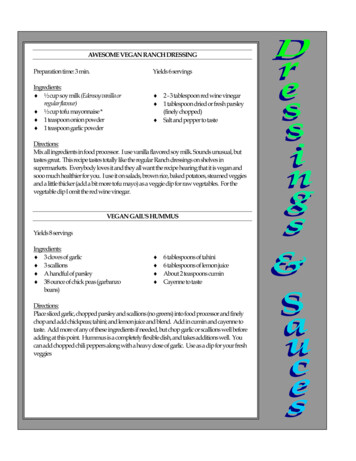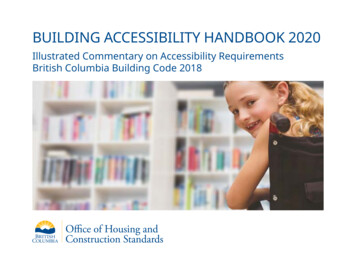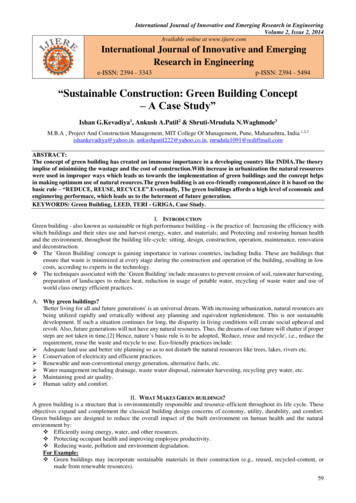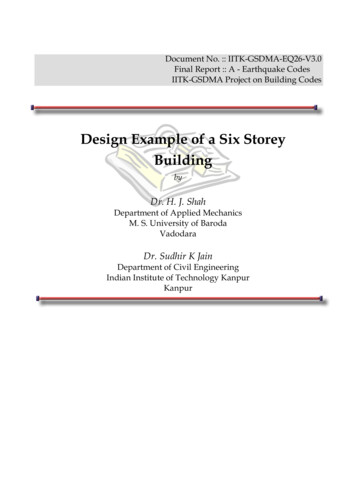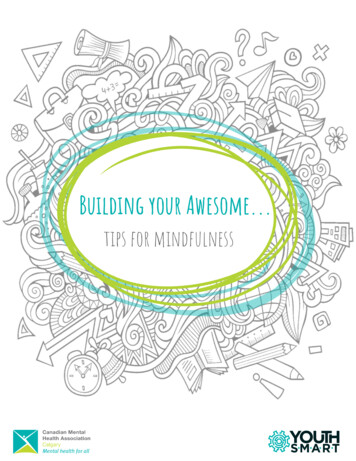
Transcription
Building your Awesome.tips for mindfulness
MindfulnessBeing in control of your mind, rather than lettingyour mind be in control of you.Complete Awareness (opened minded): being aware of the present moment(i.e. thoughts, feelings, and physical sensations) without judgment and without trying to change it.Intentional Awareness (focused mind): staying focused on one thing at a timeBeing mindful can:1.2.3.4.5.6.Give you a deeper understanding of your behaviorLower your emotional stress and increase joyHelp you focus so you can make good decisions.Help you focus your attention which can make you more effective and presentAllow you to feel compassionate to yourself and others.Decrease your pain, tension, and stress, and even improve your health.Mindfulness skills require lots of practice. Similarly to learning any new skill, we must practice first even when youdon’t need the skill. If the skill is practiced in easier situations, it becomes an automatic skill and you will have it when youneed it. Try practicing this skill with your eyes open and with them closed.Example:Imagine that there is a spiral staircase within you, winding down to your very center. Starting at the top, walk very slowlydown the staircase, going deeper and deeper within yourself. Notice the sensations.Rest by sitting on a step or turn on lights on the way down if you wish. Do not force yourself further than you want to go.Notice the quiet. As you reach the center of yourself, settle your attention there perhaps in your gut or your abdomen.You can access mindfulness audio clips on YouTube and through various apps such as Calm, HeadSpace, Aura and Zen.You can also engage in mindfulness through solo activities, like knitting, coloring, doodling etc. It’s important that youfind a method of mindfulness that works for you. We are all different!
Distress ToleranceWhy bother coping with painful feelings and urges?Pain is part of life and can’t always be avoided.If the pain you’re feeling is very intense, it’s possible that we may act impulsively.When you act impulsively, you may end up hurting yourself, hurting someone else, and notgetting what you want.Sometimes it’s important to distract yourself in times of intense emotions. We use ACCEPTS to help us do this.ActivitiesDo something! Call or visit a friend. Watch a fun movie or tv show. Write in your journal, clean your room.Go for a walk. Read a book! Listen to music.ContributingContribute or do something nice for someone else. Help a friend or sibling with homework. Make somethingnice for someone else. Give a loved one a hug.ComparisonsCompare how you are feeling now to a time when you were doing worse. Think about others who are coping thesame as or less well than you. Practice gratitude for what you have, and how much you have grown.EmotionsTry to create different emotions. Watch a funny TV show or emotional movie. Listen to something soothingor to upbeat music. Get active and feel the endorphins of exercise!Pushing AwayPush the painful situation out of your mind temporarily. Sometimes, when experiences are so tough to dealwith, it can help to actively ‘leave’ the situation by moving your attention away from it.ThoughtsTry to replace your thoughts. Try reading, doing puzzles, color, sing or any activity that requires your focusand concentration!SensationsIntensify one of your five senses. Chew ice, listen to loud music, take a cold shower or a hot bath, squeezea stress ball, do sit-ups or pet your cat or dog.
Distress ToleranceWhy bother coping with painful feelings and urges?Sometimes our emotions get so intense, that ACCEPTS doesn’t work. At these times, wecan use TIP to help calm our physical body which can help calm our mind.TemperatureTry to calm your body by splashing cold water on your face.Intense ExerciseThis can help to calm your body when it’s revved up with emotion. Even if it’s for a few minutes,intense aerobic exercise can calm the body by releasing built up energy.Paced BreathingDo something! Call or visit a friend. Watch a fun movie or tv show. Write in your journal, clean your room.Go for a walk. Read a book! Listen to music.Practice, practice, practice! The more familiar you are with these skills, the easier it will be to use them in times ofneed. Be mindful that we are all different! Not every skill will work for you. Try a few of these ideas out and write downthe ones that work best for you.What are some healthy techniques you can think of that help you cope with painful feelings and urges?Try and pick 3 to make an acronym of your own so you won't forget!
Distress Tolerance& MindfulnessSometimes our emotions get so intense, that ACCEPTS doesn’t work. At these times, wecan use TIP to help calm our physical body which can help calm our mind.Observe your thoughtsTry to observe and be mindful of your thoughts. Think of them as waves that come and go.Try to not judge your thoughts but to just acknowledge their presence.Try to take a step back and observe your thoughts.Adopt a curious mindAsk yourself "where are these thoughts coming from?"Be mindful that every thought that comes into your mind, also leaves your mind.You are not your thoughts!Try not to act on your thoughts but instead remember that there are times when we’ve hadvery different thoughts.When we are in moments where we feel very sad, or very angry, our thoughts reflect howwe are feeling.Remember how different our thoughts are when we are feeling happy or joyful.Thoughts are not fact.Try not to block or suppress your thoughtsAsk yourself: what do these thoughts mean? Bring yourself back by paying attention to oursensations. What’s happening in my body? How do I feel right now?Step back, and let your thoughts come and go.Try to be compassionate to yourself, regardless of how your thoughts are making you feel.These skills can be hard to use at times, but they get easier the more you use them. It’s important to be mindful of ourown thoughts, because they can become pretty overwhelming at times. The more awareness we have of ourthoughts, the easier it will become to manage uncomfortable feelings and emotions.Of course, sometimes we have to deal with difficult emotions and work to accept the reality of the situation. Once webecome more mindful of our own emotions and thoughts, we can work to accept the feeling and manage our discomfort.
Emotion RegulationRegulating our emotions is important because:Helps us to understand the emotions we experience.We can observe and describe our emotions!We can also know what our emotions do for us. Is this helping in the moment? Or is thisemotion making me feel worse?Lower emotional vulnerability.This will allow us to stop unwanted emotions from becoming overwhelming in the first place.We can begin to increase positive experiences and build resilience.Lower the amount of unwanted emotions.Lower emotional suffering and reduce unwanted emotions once they start.This will allow you to let go of distressing emotions by using mindfulness.This can allow you to change your emotions through opposite action (doing exactly the oppositeof how we feel).Emotions are good things!They give us information. They provide us with a signal that something is happening (i.e. I feel nervous being alone inthis alleyway). Sometimes they communicate our ‘gut’ feelings and make us aware of how we feel. It’s important to bemindful that emotions are not always facts, so sometimes we have to investigate the situation. Remember: when indoubt, check it out!Emotions can help us communicate with other people through facial expressions, body posture and tone of voice!Sometimes we don’t realize it, but emotions can influence how other people respond to you.Emotions also motivate and prepare us for action! If we hear a loud noise, we are startled, and our body jumps intoaction. They help protect us before we can even think about the situation.
Emotion RegulationWe have to focus on increasing positive experiences and building resilience withinour emotions! We can do this by trying ABC PLEASE.Accumulate positive experiencesFocus on taking part in activities that you enjoy, and that make you feel goodBuild masteryEnjoy your hobbies and feel good about all the accomplishments you have! No matter how big or how small.Coping ahead of timeWe can begin to recognize the situations that bring us stress, so we can start to plan ahead. For example,getting lots of sleep before a stressful exam or planning a fun activity after your stressful dayPhysicaL illnessTaking care of your physical health. See a doctor if necessary.EatingMaintaining a good, nutritious diet. Food is fuel!Avoid mood altering drugsStay off non-prescribed drugs and try to limit caffeine.Sleep hygienePrioritizing sleep! Sleep is restorative and allows us to feel energized day to day. Try to get the amount ofsleep that helps you feel good.ExerciseEngaging in physical exercise can help our mood and our energy! Even 20-30 minutes a day can drasticallyhelp how we feelA focus on all of theseareas allows us to buildself-confidence, have pridein our behaviors and buildjoy into our lives!
Interpersonal EffectivenessInterpersonal effectiveness focuses on how to improve your relationships. It’s important that we clarifyour needs in relationships while respecting them and ourselves. Sometimes we have to set boundaries inrelationships, which sometimes means saying no. This can be uncomfortable at times. This skill teachesus how to act in a way that maintains positive relationships, allow others to feel good aboutthemselves and about you. When we need to get someone to do something that you want in arelationship, we use DEAR MAN to help.DEARDescribe the situation and stick to the facts!Express your feelings by using 'I' statementsAsk what you want and say 'no' clearlyRemember that people aren’t mind readers! We need to let people know how we feel,and what we want.Reinforce the person ahead of time by explaining the positive effectsFor example, maybe you want to talk to your teacher about a low grade you got. You could DESCRIBE the situation: “Igot a C on the test". You can then EXPRESS your feelings: “I am frustrated with my grade because I studied for four days".You can ASK for what you want clearly: “Would you please go through the problems with me so I can understand why myanswers weren’t correct?”. You can REINFORCE the need for the request: “I would be able to perform better and be moreactive in class”.MANMindfulnessMe mindful of what you are asking! Keep your focus on your request.Appear confidentMake eye contact and using a confident tone of voice. Don’t let your voice betray you!NegotiateWe have to be flexible and be willing to give in order to get. Ask for the other person’sinput and try to come to a solution.For example, you can be MINDFUL of the perspective of the teacher and say: “I’ve been working hard, and I don’t thinkthis test reflects my abilities.”. You can APPEAR CONFIDENT by our facial expressions and tone, without rolling our eyes.You can NEGOTIATE and say: “I know you’re really busy and may not have time to review this with me. What do yousuggest we do so I can get feedback on my exam?”Being assertive can be difficult! But it is a strong and effective way to meet your needs while maintainingthe respect of others. It also shows your maturity to express yourself in a way that does not hurt others.Sometimes we don’t get what we want, but it’s important to maintain the respect of yourself and others!
Interpersonal EffectivenessWe can build and maintain positive relationships with GIVE. Relationships are very important, and it canbe very distressing when our relationships are not where we want them to be. These skills are simpleways to build new relationships and maintain the relationships we already have!Be GentleBe nice and respectful to others!Don’t make judgments about other people.Be aware of your tone of voice! We may think we are being respectful in what we aresaying, but sometimes are tone of voice can give off a different impressionAct InterestedListen and take interest into the lives of others!Don’t interrupt or talk over other people.Maintain good eye contact.ValidateShow that you are trying to understand the feelings or opinions of others by saying “I cansee how you feel that way” or “that sounds really hard”.Use an Easy mannerSmile, use humour and leave your attitude at the door.In relationships, we have to set appropriate boundaries to ensure that we maintain our self-respect. Youare important in relationships and we need to take care of ourselves too! Be FAST.Be FairBe fair to yourself and others.Don't over ApologizeTry not to over-apologize for your behavior for making a request or being you. At the sametime, if you’ve done something wrong or hurt someone, take responsibility and say sorry.Stick to your valuesShow that you are trying to understand the feelings or opinions of others by saying “I cansee how you feel that way” or “that sounds really hard”.Be TruthfulDon’t lie, and don’t make excuses or exaggerate.
SourcesAdapted from DBT Skills in Schools: Skills Training for Emotional Problem Solving for Adolescents (DBT STEPS-A) byJames J. Mazza, Elizabeth T. Dexter-Mazza, Alec L. Miller, Jill H. Rathus, and Heather E. Murphy. Copyright 2016 TheGuilford Press.Practice your mindfulness and get creative!Did you know many mental health professionals recommendcolouring as an effective way to practice mindfulness?
Mindfulness s ills require l ts of practice. Similarly to l rning any new skill, we must practice first even when you don't n ed the skill If the sk ll is ract ed in eas er i ua ions it becom s an aut m tic skill nd you w ll have it when you need it. Try practicing this skill with your eyes open and with them closed. Being mindful can:


